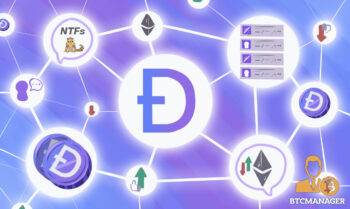
2018-7-31 21:05 |
Social networking permeates much of our modern day lives. So much so that entire industries and companies have emerged out of nowhere in an effort to cash in on one of man’s most basic necessities – the need to connect. But now, as these networks approach full maturity, the internet community is asking some serious questions about the benefits over the drawbacks.
You will no doubt be familiar with the Facebook scandal that affected many of its users. As usual, the unfolding drama all boiled down to one major problem – a question of trust. And trust-less systems are front and center of blockchain-based solutions. What exactly will the blockchain social network of the future look like? Let’s take a look at how current networks could evolve.
Freemium – It’s Free But You Still Have to PayThe digital social network experience has ushered in a new type of business model, the freemium one. Almost all successful tech-based social media platforms these days offer free access to their content. Facebook, Twitter, LinkedIn, Reddit, you name it, they all provide it.
The rise of social media. Courtesy of Conservation Prism
But unlimited free access does not pay the bills. Development, server infrastructure, and staff are no small costs in a social networking business. So how are these companies bringing in cash? In short, advertising and analytics.
AdvertisingThe freemium model’s first priority is to build up a large user base. Once you’ve achieved this, the tough bit really kicks in: how to sell stuff to these people. Unfortunately, online advertising is not a very innovative field and has remained relatively unchanged for quite some time. As a result, most networks these days simply sell website whitespace. The more eyeballs you get, the more money you make.
A sobering look at popular social networks reveals a worrying trend; platforms are ramping up their advertising efforts. Let’s look at a simple comparison of the well-loved question or answer site Quora. On the left, we have the current site and the right, a cleaner version from a few years back:
Quora – only a spammy shell of its former glory
The Quora feed is now riddled with advertising links. This is a big no-no in the world of online marketing. A marketer’s goal has always been to drive people to a site through valuable content creation, not link users away aggressively as above.
A growing number of previous Quora users no longer use the site because finding relevant content while digging through all the trash has become too much of a hassle.
AnalyticsWhile the bulk of Facebook’s revenue is generated from targeted advertising, it does also make money, controversially, from selling user data. Facebook is in the powerful position of seeing consumer trends well before just about any other business on the planet.
And you can be sure that all those other businesses are prepared to pay, and pay well, for that kind of information. There are no official revenue numbers on this, however, as companies like Facebook and Google typically prefer to keep those numbers hush-hush for obvious reasons.
Blockchain to the Rescue?Steem is one of the oldest examples of a blockchain social network in action. It provides us with valuable insights into the early exploration of this field. The first players in the space do not always dominate, as we saw with MySpace and some other early adopters that were crushed by second-generation companies.
Some of the fundamental problems facing the mature social network of today include:
Fake news (Facebook) Excessive trolling (Twitter) Censorship and demonetization (Youtube) Outright scamsThe Facebook debacle has certainly provided an opportunity for budding blockchain entrepreneurs to jump in and promise “a revolution if you’ll just throw some money our way.” But do these blockchain social network startups have the chops to back up those claims? It’s clear that they have a tough road ahead. Fortunately, blockchain has much to offer.
1. Transparency & GovernanceA properly implemented blockchain would allow important information and transactions to be verified by different servers, developers and, in fact, users of the actual community. Blockchain social networks that implement a transparent democratic process of how the network is run, will adopt users far more quickly than those that don’t.
Projects like Aragon are tackling these issues of blockchain governance and digital jurisdictions head on. The focus of Aragon is on allowing anyone to build decentralized organizations with more horizontal company structures. Furthermore, you gain the ability to build your own digital court system and let the network decide how to resolve disputes and move the company forward.
2. Monetizing Your ContentFull-time content creators know all too well that making money in the current internet environment requires handing over your power to third-party ad networks or subscription-based services. Seems like the middleman is just around every corner.
However, blockchain projects like the Brave browser, through the use of their cryptocurrency the Basic Attention Token (BAT), are attempting to remove these middlemen altogether. In the Brave ecosystem, publishers, users, and advertisers transfer value amongst themselves, and users can contribute to their favorite creators directly with BAT.
In addition, you can choose to opt-in on advertising and get paid for doing so, eliminating the need for advertisers to force their campaigns on users who are simply not interested. Publishers too can reward loyal followers through competitions, social media shares and so on. All of this, without the need for a third party.
3. Control Over Your DataAn important element of functional blockchains is removing the ability to double spend on transactions. Each ledger entry needs to be unique. This principle can be applied to protect user identities from fraud and deal with the current epidemic of bots and fake accounts.
Civic, a self-described “secure identity ecosystem,” is working to address these problems. In a blockchain social network, you finally have the opportunity to own your own data and decide exactly who else has access to it. Furthermore, if you decide to delete parts or all of your data, it would be deleted everywhere on the network. There’s no need to worry whether unauthorized players still have access to it and could, therefore, buy or sell in the shadow advertising market.
Risks AhoyThe Steem platform is an interesting experiment and continues to highlight some of the problems that blockchain social networks will have to overcome as these networks are being built.
1. PlagiarismPlagiarism is still a very big problem for content creators on Steem. Despite Google’s ongoing demonetizing campaign via YouTube, its content algorithms are particularly effective at dealing with duplicate content. Google understood early on as they were building their search engine, that an internet filled with copy-pasted content could become worthless very quickly. This is a serious problem that blockchain social networks are currently not addressing.
2. BotsBots have become a real threat to the viability of some social networks. Sneaky developers comb through lines of code looking for ways to game the system. For example, on Facebook, likes and shares hold a lot of weight, and bots are used to create hundreds and thousands of fake accounts. The use of bots can result in pages can be pushed up the rankings.
In the case of Twitter, bots are known to ambush important figures and popular accounts. In addition, fake profiles promoting scams are making it difficult to have genuine discussions on the platform. This problem has found its way onto the Steemit network too. A commenter in a recent medium post on the subject had the following to say:
“Bid bots are destroying the platform and it’s too far gone I’m afraid. Manual curation is no longer incentivized.”
3. Token EconomicsDespite promises of financial equality in the cryptocurrency ecosystem, we are still seeing problems that exist in the traditional system. Namely, when a few players get hold of a large number of tokens this inevitably leads to these whales directing how the network functions. Democracy does not just come pre-packaged with every blockchain, it needs to be properly implemented.
The Steem token price has not held up particularly well in the markets to date either. Attracting top-quality content creators to a network requires a community that can pay them with a valuable token. And with a token that will hopefully hold its value in the future.
4. First Mover AdvantageThe fact is that Facebook has over two billion monthly active users. It took 14 years to achieve this. Projects X, Y, and Z are not just simply going to roll in and beat older, more established projects without a fight, blockchain or not. There is a very real possibility of Facebook simply adding their own cryptocurrency into the mix. They have a huge war chest to fund development too. Likewise, they have working products that don’t need to be associated with the somewhat scammy image of ICO’s.
Conclusion: The Future of the Blockchain Social NetworkMaking the next blockchain Facebook or blockchain Twitter is not going to be an easy task. In the cases of Facebook and Twitter, decisions are made by the most powerful people in the organization. Since these companies are publicly traded, those decisions tend to be based on maximizing profits for shareholders, not maximizing value for users.
The blockchain social network of the future will turn this model on its head and will look to create value for everybody in the network: developers, creators, investors, and users alike. It’s still early days and there will be many failures. But at first glance, many projects are hinting that we are in for a wild revolutionary ride. So strap yourself in and stay tuned!
The post Social Networking on the Blockchain | An Industry Ripe for Disruption appeared first on CoinCentral.
Similar to Notcoin - Blum - Airdrops In 2024
onG.social (ONG) на Currencies.ru
|
|



















